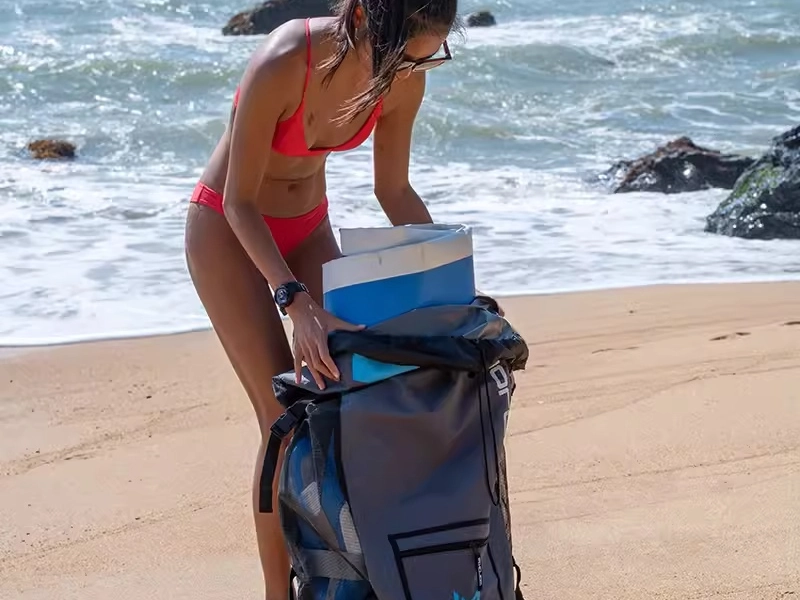Investigating fresh locations and chasing swells can have a significant carbon footprint. Fortunately, there are several methods you may minimise your influence. Selecting surf locations with eco-certifications and sustainability top priorities, for instance, will help. One further option is to balance your flights. This helps approved emission reduction initiatives and balances the emissions from your journey.

 Though they are the most carbon intensive kind of transport, flights are sometimes necessary. Many airlines now let you pay an extra cost on top of your ticket price to help offset the carbon emissions of your travel.
After that, this money is put towards programs including renewable energy projects and reforestation that lower greenhouse gas emissions. Third-party companies review these carbon offsets to guarantee they are efficient, not overstated, and support sustainable development objectives.
Among reliable offset developers are Cool Effect and Wildlife Works. Additionally bought for other sources of CO2, such as household and automobile energy consumption are offsets.
Although many people find this idea appealing, some think it's a bit of a hoax pushing normal customers' responsibility for air pollution instead of the major pollers. This is a viable alternative, though, if you are worried about the environmental effect of your travel and do not wish to give up flying completely.
Though they are the most carbon intensive kind of transport, flights are sometimes necessary. Many airlines now let you pay an extra cost on top of your ticket price to help offset the carbon emissions of your travel.
After that, this money is put towards programs including renewable energy projects and reforestation that lower greenhouse gas emissions. Third-party companies review these carbon offsets to guarantee they are efficient, not overstated, and support sustainable development objectives.
Among reliable offset developers are Cool Effect and Wildlife Works. Additionally bought for other sources of CO2, such as household and automobile energy consumption are offsets.
Although many people find this idea appealing, some think it's a bit of a hoax pushing normal customers' responsibility for air pollution instead of the major pollers. This is a viable alternative, though, if you are worried about the environmental effect of your travel and do not wish to give up flying completely.
 Choosing locations that give environmental integrity top priority becomes more crucial as the surf business develops into a sustainability centre. Many surfing sites deal with coastline erosion and water pollution problems that could compromise the environment generally and marine life.
Selecting to investigate nearby surf locations can help to reduce the demand for transportation emissions and air travel. This is an experience to live always since it helps one to develop a closer relationship with the surf community and surroundings.
If you must fly, think about selecting nonstop routes to cut petrol consumption. Staying longer in one place will also help you to maximise your trip. Apply Leave No Trace guidelines and pick up any rubbish you come across in the beach or in natural surroundings throughout your stay. Finally, either start or join a surf club endorsing environmentally friendly projects and sensible waste management. This is a great approach to set a model and motivate others to act.
Choosing locations that give environmental integrity top priority becomes more crucial as the surf business develops into a sustainability centre. Many surfing sites deal with coastline erosion and water pollution problems that could compromise the environment generally and marine life.
Selecting to investigate nearby surf locations can help to reduce the demand for transportation emissions and air travel. This is an experience to live always since it helps one to develop a closer relationship with the surf community and surroundings.
If you must fly, think about selecting nonstop routes to cut petrol consumption. Staying longer in one place will also help you to maximise your trip. Apply Leave No Trace guidelines and pick up any rubbish you come across in the beach or in natural surroundings throughout your stay. Finally, either start or join a surf club endorsing environmentally friendly projects and sensible waste management. This is a great approach to set a model and motivate others to act.
 Although surfing might not be the greenest of sports, there are plenty of ways you might lower your carbon footprint and save the earth. One approach to help the earth is to buy surf gear created from recycled or biodegradable materials and support companies whose operations give sustainability top priority.
If you must purchase new machinery, search for locally produced goods or renewable energy sources-powered models. Another excellent way to minimise your impact and turn the trip to your neighbourhood beach into a group eco-venture is by carpooling or ride sharing among friends.
While avoiding air travel is a terrific strategy to reduce your surf trip carbon footprint, considering the appeal of long-haul travels to isolated breaks it is not always practical. Fortunately, purchasing carbon offsets supports projects that help to slow down climate change and offers you peace of mind for your ideal vacations.
Although surfing might not be the greenest of sports, there are plenty of ways you might lower your carbon footprint and save the earth. One approach to help the earth is to buy surf gear created from recycled or biodegradable materials and support companies whose operations give sustainability top priority.
If you must purchase new machinery, search for locally produced goods or renewable energy sources-powered models. Another excellent way to minimise your impact and turn the trip to your neighbourhood beach into a group eco-venture is by carpooling or ride sharing among friends.
While avoiding air travel is a terrific strategy to reduce your surf trip carbon footprint, considering the appeal of long-haul travels to isolated breaks it is not always practical. Fortunately, purchasing carbon offsets supports projects that help to slow down climate change and offers you peace of mind for your ideal vacations.